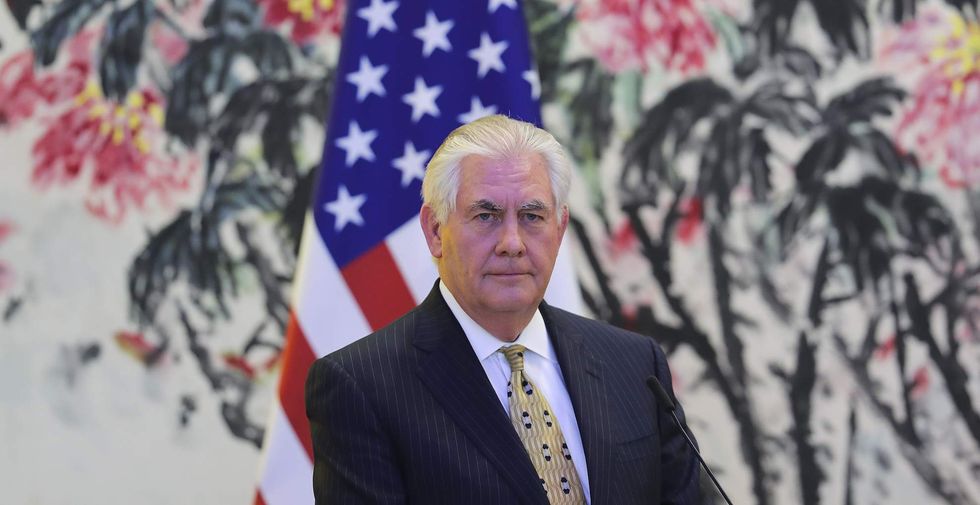Secretary of State Rex Tillerson intends to skip a NATO meeting next month and will instead meet with the Chinese president and travel to Russia later in the month, U.S. officials announced Monday.
Tillerson plans to miss what would be his first meeting April 5-6 in Brussels with the 28 NATO member states in order to attend President Donald Trump’s meetings with Chinese President Xi Jinping April 6-7 at the president’s Mar-a-Lago estate in Florida.
And on April 12, the secretary of state will travel to a series of meetings in Russia, CNBC reported. The purpose of those meetings is not yet specified.
The trip to Moscow, however, is not being discussed by the Russians. Foreign Ministry spokeswoman Maria Zakharova wrote on her Facebook page that Russia “will not be confirming or denying this information at this stage.”
A U.S. spokesperson sought to downplay Tillerson’s plan to skip the NATO summit, saying the top diplomat will meet with most of the alliance members Wednesday, when the Coalition to Defeat ISIS gathers in Washington, D.C.
Nevertheless, the decision to skip the NATO event and visit Moscow is certain to raise the eyebrows of those who feel the U.S. may be putting its dealings with Russia — which has an adversarial relationship with NATO — ahead of smaller countries in the alliance that depend on Washington for their security.
The North Atlantic Treaty Organization was created in 1949 to serve as a defense against the Soviet Union. One former NATO diplomat told CNBC that he hopes Tillerson can find a way to be at both the Russian meetings and the NATO summit.
“Given the challenge that Russia poses, not just to the United States but to Europe, it’s critical to engage on the basis of a united front if at all possible,” he said.
It doesn’t help, either, that Trump often slammed NATO on the campaign trail, referring to it as “obsolete” in mid-January and calling out other member countries for not spending 2 percent of gross domestic product on defense, as requested by alliance agreements.
Over the weekend, the president took to Twitter to attack Germany, saying the European ally “owes vast sums of money to NATO.”
But according to one former U.S. ambassador to NATO, Trump’s comments are somewhat misleading.
“There is no ledger sheet that shows Germany in the red,” Doug Lute, who served as ambassador under former President Barack Obama from 2013-17, told ABC News. “That’s not how it works in NATO.”
And German Defense Minister Ursula von der Leyen said: “There is no debt account in NATO.”
However, Germany — like many other NATO members, including Canada, Spain, and Italy — has not been spending 2 percent of GDP on defense. By contrast, the U.S. has been spending between 3-5 percent of its GDP on defense since the early 2000s.
German Chancellor Angela Merkel, who met with Trump last week, announced Friday that her country has promised to meet the 2 percent minimum for the next seven years.
“We committed to this 2 percent goal until 2024,” she told reporters gathered at the White House.
Also, any visit to Moscow by a member of the Trump administration will be closely scrutinized following FBI Director James Comey’s admission Monday that the bureau is investigating potential collusion between the Russian government and Trump’s 2016 presidential campaign.
“It feeds this narrative that somehow the Trump administration is playing footsy with Russia,” one former U.S. official, who spoke on condition of anonymity, told CNBC. “You don’t want to do your early business with the world’s great autocrats.”
“You want to start with the great democracies, and NATO is the security instrument of the transatlantic group of great democracies,” he added.
All of this follows a dustup between the U.S. and Britain after White House press secretary Sean Spicer touted a wild claim last week from Fox News senior judicial analyst Andrew Napolitano that Obama used the British intel service GCHQ to spy on Trump.
In a statement to TheBlaze, a spokesperson for the British government totally rejected Napolitano’s claim, saying: “No part of this story is true.”
Napolitano, for his part, has been sidelined indefinitely by Fox for making the accusation. The Fox News analyst, however, stands by his claim, saying he “reported what the sources told me, reported it accurately and I do believe the substance of what they told me.”



